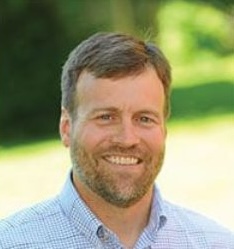
GETTING TO KNOW JIM CAFFRY.
Connecting with families and their stories is a great motivator for Elizabeth Friman, Esq., in her law practice at Fleming & Curti, PLC, in Tucson, Ariz. She loves Mexican food and puttering around in her backyard. Her best ways to chase away stress include taking walks with her dog, cooking, and sleeping in on the weekend. Learn more about Elizabeth in this short interview.
Our son was diagnosed with regressive autism a few months before he turned two. Almost 24 now, he is functionally non-verbal, has epilepsy and some wicked OCD to go along with the autism diagnosis. My wife Amy and I began our immediate quest for services and information for our son. Within a few years, we were also consumed by thoughts of what his future, and the future of his two sisters, would be. Personally, I felt I needed to know how the developmental disabilities services system works… or doesn’t work. I needed to know more than ‘here is the magic special needs trust that will ensure SSI and Medicaid eligibility’. Over the years, I came to realize that there are separate ‘silos of services’ for persons with I/DD, mental health challenges, TBI, and physical disabilities, the ins-and-outs of which are not easy for families to access and understand. After attending my first Stetson conference, I decided to chuck my environmental law practice that I established over a dozen years, and then I set out to build an all-special-needs-all-the-time practice.
I would tell them that there is a heck of a lot more to special needs planning than drafting special needs trusts. I would also say that drafting an SSI/Medicaid compliant SNT is relatively easy, and the much harder part is drafting an SNT that actually works for a particular beneficiary and the family. Finally, I would tell them that in addition to needing the fundamentals of general T&E law, they should also take classes or CLEs in administrative law and have a strong understanding of their states’ Freedom of Information Act (“FOIA”) in order to be more effective advocates for their clients with disabilities and their families.
When a governmental agency employee tells your clients “you can’t do X” or “you must do Y”, a special needs planning lawyer should have the skills to dig a little deeper. Is that agency directive based on federal law, state law, a duly adopted regulation? Or is that bureaucratic edict merely based on a policy memo, or worse yet, an unwritten “historical practice?” It can be pretty amazing to see how quickly a service agency can change its tune when it cannot produce a statutory citation and it is served with a detailed FOIA request.
Right now, I am most passionate about getting Riverflow Community (https://www.riverflowcommunity.org/) up and running for our son and other young adults with I/DD. Riverflow will provide long-term stability for individuals with high support needs, that will celebrate independence and interdependence, and do so in a financially sustainable, replicable, way. This residential model may not be for everyone, but we know that our son thrives in this environment, and that’s what person-centered planning should be all about.
Professionally, my 17 years of membership in the SNA and having the honor of serving as the 21st President of the SNA. Personally, my 27 years of marriage to my amazing wife and our 3 young adult kids, who, despite my shortcomings, all seem to think I am a pretty good dad.
Being outdoors and away from my screens… could be on skis, on foot, sitting next to a fire, or in a boat anywhere in Vermont or the Adirondacks… could be with my family, with my old friends, or could be solo (with my dogs, of course)… In my next life, I am going to come back as a backcountry skiing and fly-fishing guide.
